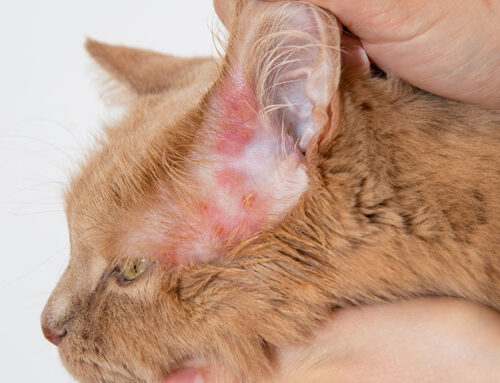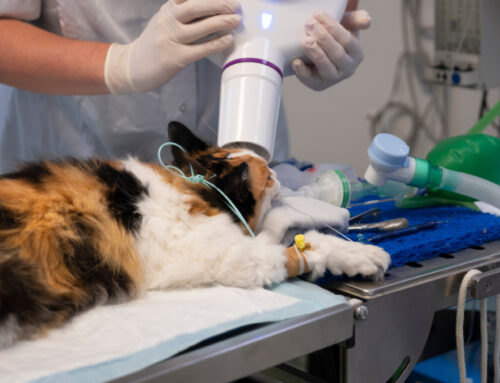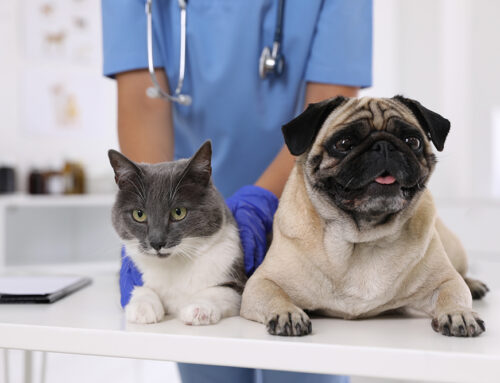We empathize with our sick or injured pets and want to do everything possible to help them, but determining how to help can be tricky. Since pets can’t explain how they feel, we must use our best judgment to determine if a trip to the veterinarian is in order. The Star of Texas Veterinary Hospital team is your best resource for pet health concerns. Here is our guide to common urgent and emergent pet health needs and how to know the difference.
What is routine care for pets?
Routine veterinary care addresses all non-urgent pet health needs, including preventive services, wellness examinations, and minor injuries, illnesses, or behavioral conditions. Primary care veterinarians handle routine care and may schedule visits several days or weeks in advance. Examples of routine care concerns include:
- Wellness examinations
- Vaccinations
- Screening tests
- New puppy or kitten visits
- Skin irritation
- Lumps and bumps
- Elective surgeries (e.g., spay or neuter procedures)
- Anxiety
- Gradual appetite or habit changes
What is urgent care for pets?
Urgent care visits are designed to handle non-life-threatening medical issues that can’t wait for a scheduled visit. Urgent care bridges the gap between routine primary care and emergency care and addresses pet issues 24 to 48 hours after onset. Some primary veterinary clinics, including ours, will fit urgent cases in the schedule whenever possible.
Some clinics focus solely on urgent care, providing walk-in treatment during extended evening and weekend hours. Unlike emergency clinics, urgent care facilities do not offer overnight hospitalization, intensive care, or access to specialists.
When to choose urgent care for pets
Urgent care may be the appropriate choice for pets suffering from:
- Minor cuts, punctures, torn nails, or other wounds
- Persistent, mild vomiting or diarrhea
- Minor limping
- Mild to moderate pain
- Ear infections
- Urinary tract infections
- Unusual behavior changes
- Squinting or eye irritation
- Bug bite or sting
What is emergency care for pets?
Emergency care is for pets with life-threatening conditions that require immediate treatment to prevent severe complications or death. Emergency veterinary hospitals are usually open 24/7 to handle pressing situations and monitor critically ill pets around the clock. These facilities are staffed with specially trained team members, including critical care specialists, and may have access to on-call specialists in other disciplines.
When to choose emergency care for pets
Here are some examples of when to seek emergency care:
- Difficulty breathing or bluish gums
- Severe trauma (e.g., hit by car, fall from a height, animal bite)
- More than one seizure in 24 hours
- Known or suspected toxin ingestion
- Uncontrolled bleeding or unexplained bruising
- Severe pain or distress
- Weakness or paralysis
- Collapse
- Inability to urinate, especially male cats
- Severe vomiting, unproductive retching, or diarrhea
- Incoordination
- Eye injuries
How to prepare for a pet emergency

Follow these tips if you find yourself in an urgent or emergent pet situation:
- Know before you go — Be familiar with the location of the closest urgent care clinics and emergency veterinary hospitals.
- Keep emergency numbers handy — Program your phone with our contact information and that of the nearest emergency facility, extended-hours urgent care facility, and poison control hotline.
- Try a telehealth line — Veterinary telehealth apps, websites, and hotlines are becoming more widely available. You may have access to a telehealth line—which can provide real-time advice on whether your pet needs emergency care—through your pet insurance, employer, or pet store membership.
Always err on the side of caution and trust your instincts—if you think your pet needs help, do not hesitate to reach out and contact the Star of Texas Veterinary Hospital team. We can handle your pet’s routine, urgent, and emergency care needs during our regular hours. If we’re unavailable, contact the nearest emergency veterinary hospital, veterinary telehealth helpline, or veterinary poison control helpline for assistance.







